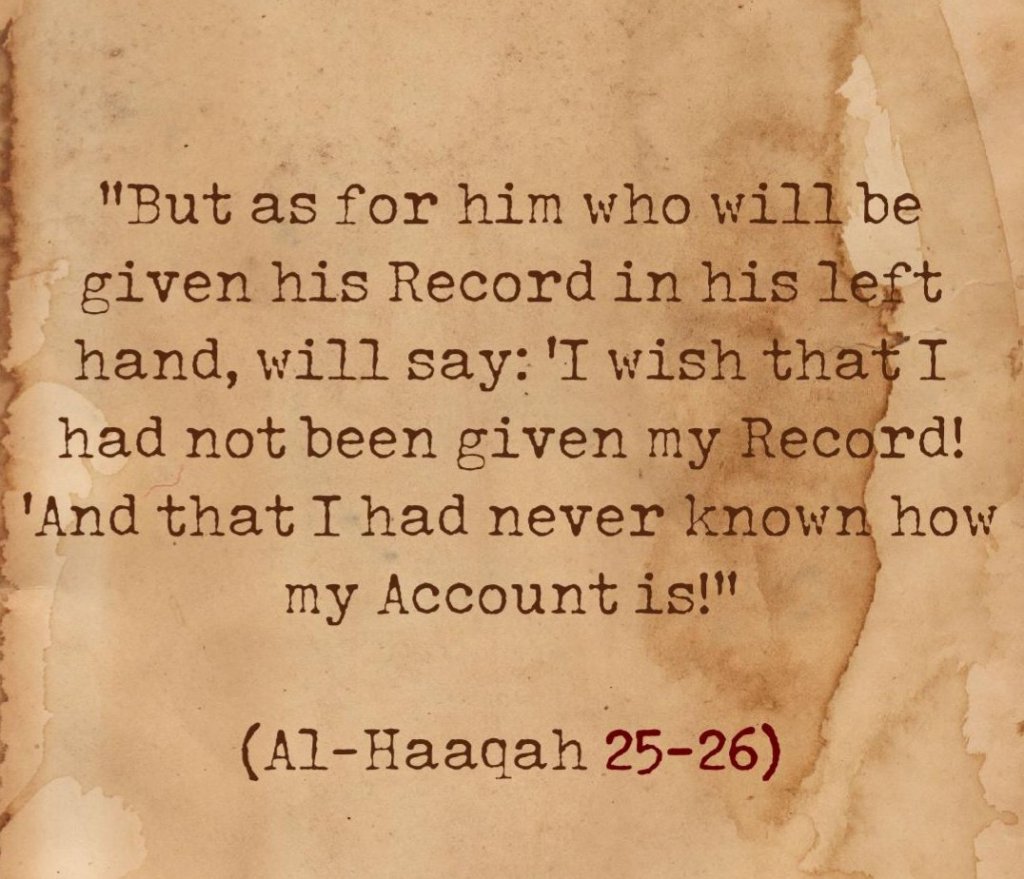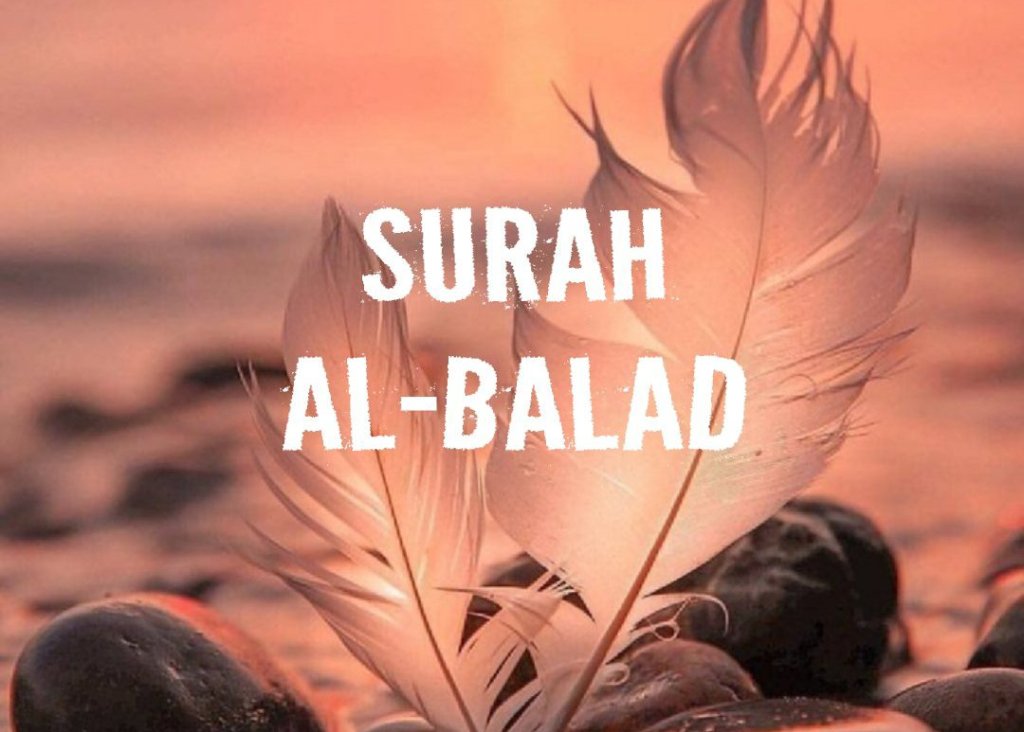
Surah Al-Balad is a Meccan Surah with twenty verses. Balad means The City. The Surah has been so named after the word al-balad in the first verse.
Its subject matter and style resemble those of the earliest Surahs revealed at Makkah, but it contains a pointer which indicates that it was sent down in the period when the disbelievers of Makkah had resolved to oppose the Prophet pbuh, and made it lawful for themselves to commit tyranny and excess against him.
In this Surah a vast subject has been compressed into a few brief sentences, and it is a miracle of the Quran that a complete ideology of life which could hardly be explained in a thick volume has been abridged most effectively in brief sentences of this short Surah.
Its theme is to explain the true position of man in the world and of the world in relation to man and to tell that God has shown to man both the highways of good and evil, has also provided for him the means to judge and see and follow them, and now it rests upon mans own effort and judgment whether he chooses the path of virtue and reaches success or adopts the path of vice and meets with doom.
Allah takes few oaths in start of the Surah and stresses upon the point that this world is not a place of rest and ease for man, where he might have been born to enjoy life, but here he has been created into toil and struggle. Then man’s misunderstanding that he is all in all in this world and that there is no superior power to watch what he does and to call him to account, has been refuted.
Allah has given man the means of knowledge and the faculties of thinking and understanding and made clear for him both the highways of virtue and vice: one way leads down to moral failure, and it is an easy way pleasing for the self; the other way leads up to moral heights, which is steep like an uphill road, leading to success. It is upto man which path to choose and decide his final destiny. The end of those who follow the uphill way is that they would become worthy of Allah’s mercies. On the contrary, the end of those who follow the steep down way, is the fire of Hell from which there is no escape.

Allah swears by “This City”: means the city of Makkah. Why an oath was being sworn by this City? Because the people of Makkah were well aware of the background and importance of their city and knew how in the midst of desolate mountains, in an un-cultivated, barren valley, the Prophet Ibrahim a.s had brought his wife and suckling child and left them there without any support; how he had built a House there and proclaimed to the people to visit it as pilgrims when there was no soul for miles around to hear the proclamation, and then how this city had eventually become the commercial and religious center of Arabia and was blessed with such sacredness that there was no other place of security beside it in that lawless land for centuries.
The verse begins with ‘La’ which means _No! To begin a discourse with a “Nay” and resume it with an oath means that the people were asserting a wrong thing to refute which it was said: “Nay, the truth is not that which you seem to assert, but I swear by such and such a thing that the truth is this and this” As for the question what it was to refute which this discourse was sent down, it is indicated by the theme that follows. The disbelievers of Makkah said that there was nothing wrong with the way of life that they were following, as if to say: “Eat, drink and be merry for tomorrow we die in the natural process of time. Muhammad pbuh, without any reason, is finding fault with this way of life and warning us that we would at some time in the future be called to account for it and rewarded and punished accordingly.” So it’s like Allah gives them a shut up call and driving their attention to this important message by starting the oath with La!
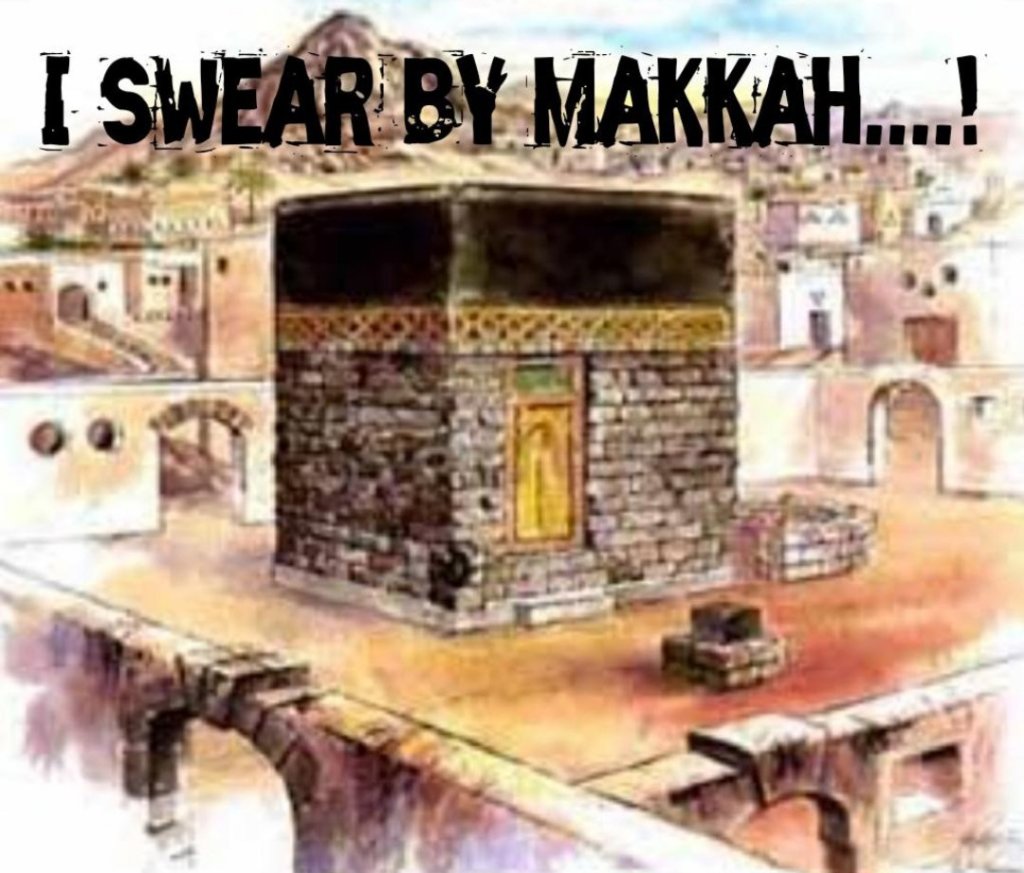

After mentioning Makkah, which is the chief of all cities, Allah mentions the leader of all His slaves, the Messenger pbuh. Allah says that he is ‘hil’ in this city. The word hil has many origins and one of its meanings here is ‘You (Muhammad) have become permissible in this city’. The people of Makkah including the polytheists enjoy the peace of Makkah and they respect it to the extent that they do not even hunt in the city, preferring to go outside the city to hunt. They even called the city Al Haram (a place where killing is not allowed) and recognise this city as a sanctuary and this was passed on through the teachings of their forefather Prophet Ibrahim a.s. Yet, when it comes to the Messenger pbuh these disbelievers suddenly consider it halal to kill him and so the Messenger pbuh is being told that a time is coming when the mushrikeen will make halal this sacred law which has been made haram for them.
A second opinion regarding hil is that Allah is informing the Messenger pbuh that something will be made permissible for him that has not been made permissible for anyone before him. This implies that at conquest of Makkah for one day only it was permissible for Muhammad pbuh, within the sanctuary, to order the execution of certain war criminals that had to be punished (although on the most part there was forgiveness). Allah is telling the Messenger pbuh that it will be halal for him to implement punishment on the disbeliever, which does not make sense in the Makkan context, and this surah by consensus is Makki. It only makes sense in the context of victory and so in this statement there is a guarantee of the victory of Islam.
A third opinion comes from the understanding that the word hil also can mean to arrive at or to descend on a place. By this the Messenger pbuh is being told that he is a permanent fixture of the city. In other words even when he is expelled from the city, he will nevertheless come back and establish his rule and this is another way in which the guarantee of the victory of Islam has been given to the Prophet pbuh. The root origin of the word ‘hil’ is ‘halla’ and literally means to untie something. So Allah has honoured Makkah twice. Firstly, by taking an oath by this blessed city and secondly by giving a messenger who descended on the city with revelation.
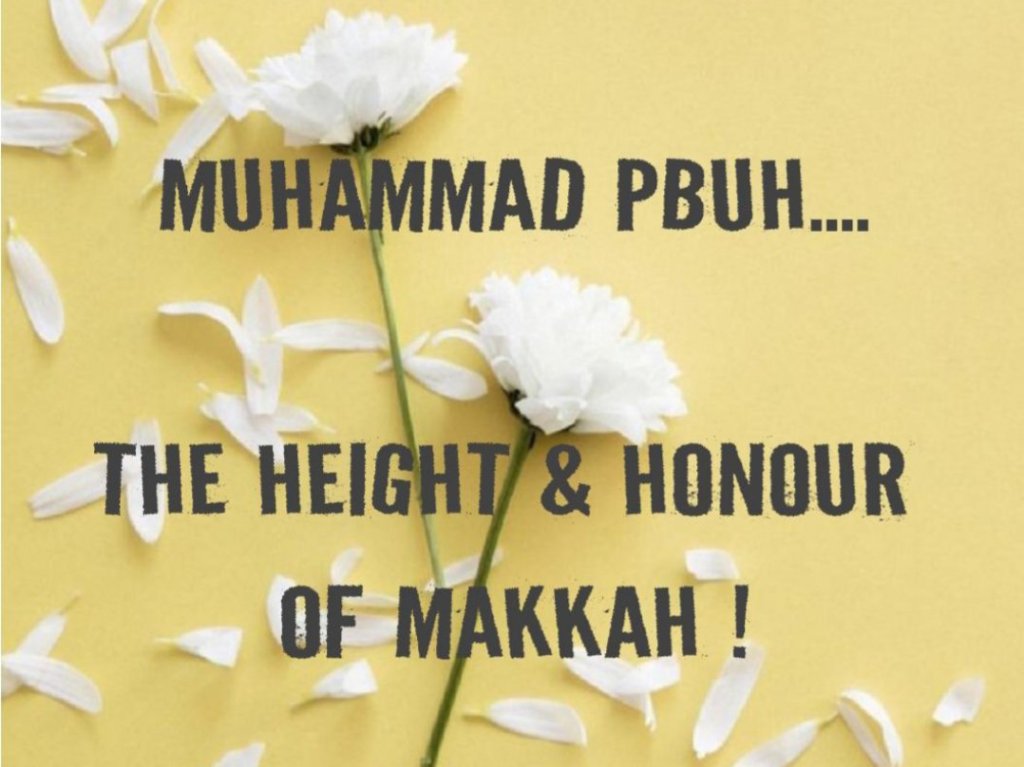

Now Allah swears upon the begetter and whom he begot. This has either of two meanings,
1). The begetter is Adam a.s and whom he begot is his children. The human beings who existed in the world, exist today and will exist in the future.
2) The begetter is Ibrahim a.s and whom he begot is Ismail a.s and his lineage. Referring to the oath in the previous verse made to the city of Makkah, and we do know that Ibrahim a.s and his son were the founders of Kaaba and Makkah. The pagan Arabs maintained an extraordinary importance for Ibrahim a.s and his son and they were very proud of them.
So from Ibrahim a.s came his son Ismail a.s and through his lineage Muhammad pbuh, the final Messenger of Allah. Allah here is referring to the father of this city who inaugurated it and started this legacy and built the house of Allah. It was Ibrahim a.s who made the dua in Surah Baqarah:
‘Our Lord, and send among them a messenger from themselves who will recite to them Your verses and teach them the Book and wisdom and purify them. Indeed, You are the Exalted in Might, the Wise’(2:129).
The fulfilment of that dua was ultimately Prophet pbuh, the final messenger of Allah.
Allah here is showing His amazement to the Messenger pbuh who is staying true to the message of his father Ibrahim a.s but also His shock that the vast majority of Ibrahim’s children are rebelling against the legacy of their own father by rebelling against the Messenger pbuh. How can the Quraish plot the murder of Muhammad pbuh who is simply reviving the religion of their father Ibrahim a.s?
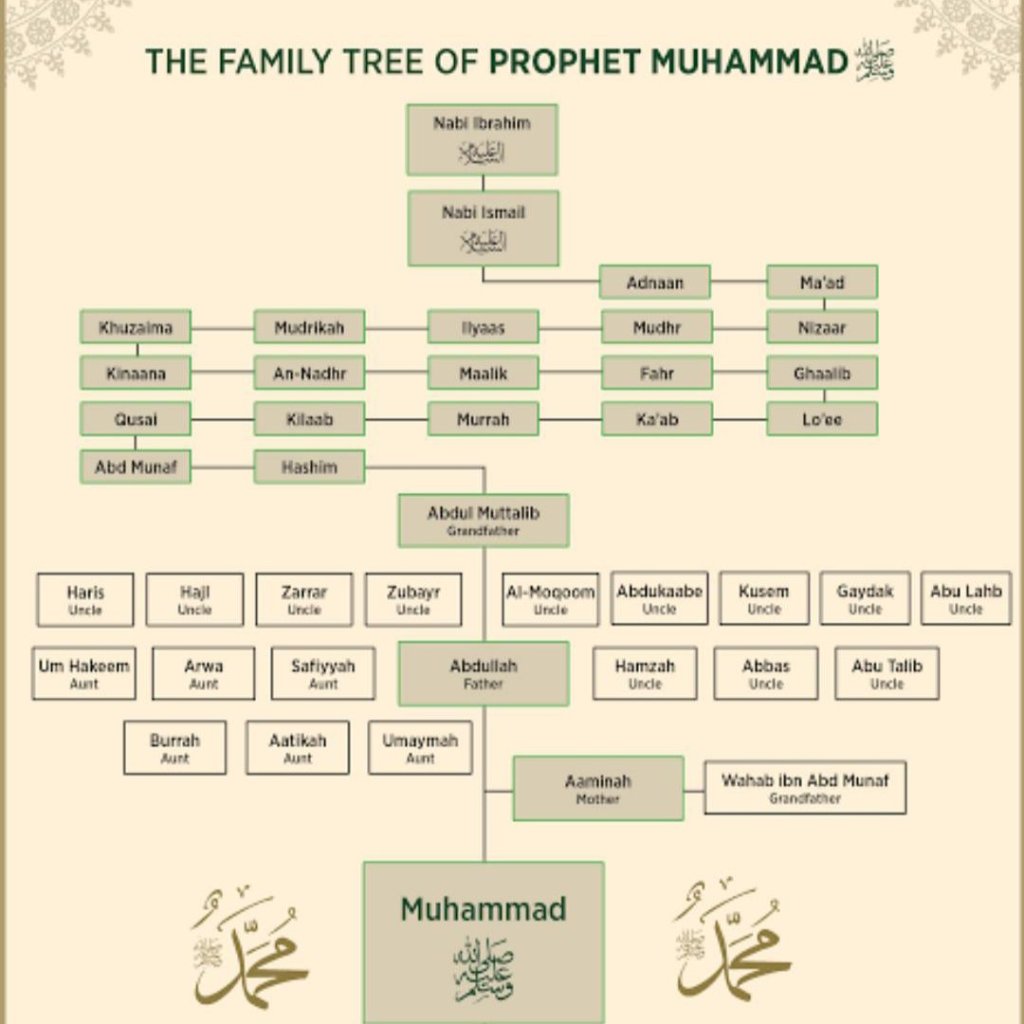

This is the subject for which the oaths have been sworn. Man’s being created in toil means that man in this world has not been created to enjoy himself and live a life of ease and comfort, but the world for him is a place of enduring and undergoing toil, labor and hardship, and no man can be immune from this.
The city of Makkah is a witness that a servant of Allah toiled and struggled hard, then only did it become a city and the center of Arabia. In this city of Makkah the condition of Prophet Muhammad pbuh is a witness that he is enduring every kind of hardship for the sake of a mission; so much so that there is full peace here for the wild animals but no peace for him. Then, every man’s survival, from the point he is conceived in the mother’s womb till the last breath of life, is a witness that he has to pass through trouble, toil, labor, dangers and hardships at every step. Wether it be rich or poor, every man has concern and point of worries in life for which he is constantly struggling.
The word kabad means the middle of the day which was the toughest part of the day for the Arab. It also means to be immersed in the middle of a sand dune making walking difficult as your feet becomes embedded in the sand. The word kabad also refers to the liver and kibd was used when your liver was injured resulting in pain and hardship. The path of Allah and path other than Allah both has struggle in it, if man uses struggles for path of Allah, his struggles won’t be a waste and will lead him to success ultimately!


Now Allah describes the psychological conflict of man. On the inside man is stressed and worried but trying to maintain an exterior that does not indicate stress. And such a person who thinks there is no power over him who watches him and is reckoning, is not concerned and serious about the future/Akhirah. Anyone who does not reflect on the past and how Allah has dealt with arrogant people before has not prepared for the future.
Man is in delusion that he can do what he likes, and there is no superior power to seize and suppress him? The fact, however, is that even before the occurrence of the Hereafter in this world itself, he sees that his destiny every moment is being ruled by some other Being against Whose decrees all his plans and designs prove ineffective. A single jolt of the earthquake, a blast of wind, a flood in the river and a sea-storm are enough to show how weak and feeble man is against the Divine forces. A sudden accident can reduce a strong person to a cripple; one turn of the fortune deposes a mighty sovereign from the position of authority. How has then this man been deluded into thinking that no one else can have power over him ?

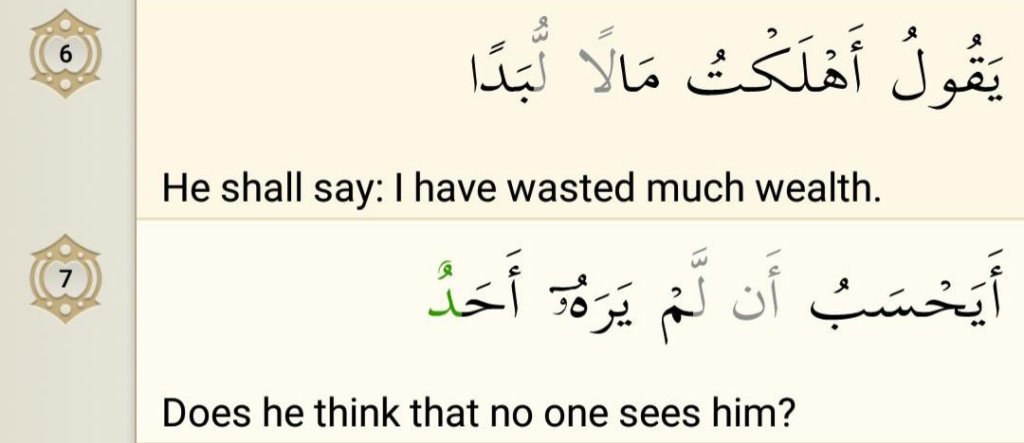
The verse is about those of whom when they were told to spend some money on good deeds, they would respond, boastfully, that they had spent much in that way but they had spent nothing; and if they had given something to anyone it had been for personal intentions and hypocritical aims.
This verse also refers to the ones who had spent much wealth on enmity against Islam and the Prophet pbuh & plotting against Islam, for which they boasted.
In general Allah reveals the human boastful psyche when his wealth increases, “I have destroyed heaps of wealth” i.e. man had squandered and wasted it. These words show how proud the speaker is of his wealth. The heaps of wealth that he spends is so insignificant as against his total wealth that he did not mind squandering it carelessly. And to what purpose did he squander it? Not for a genuine, good cause as becomes evident from the following verses, but for display of his wealth and expression of his pride and glory.
Bestowing rich awards on , poetic admirers, inviting and feeding hundreds of thousands of people on marriage and death ceremonies, gambling away heaps of wealth, trying to excel others in display of glory and grandeur, having heaps of food cooked on ceremonial occasions and throwing invitations to all, or arranging and supplying running meals at the residence so as to impress the people around with one’s generosity etc. Such were also the expenditures of ostentation, which in the days of ignorance were regarded as a symbol of man’s status symbol, and a sign of his greatness. For these they were praised and admired on, their praises were sung and on account of this they were proud of themselves against the less fortunate.
Then Allah says, “Doesn’t this boaster understand that there is also a God above him, Who sees by what means he obtained this wealth, in what ways he spent it, and with what intention, motive, and purpose he did all this? Does he think that God will put any value on his extravagance, does he think that like the world, God too will be deluded by it?”
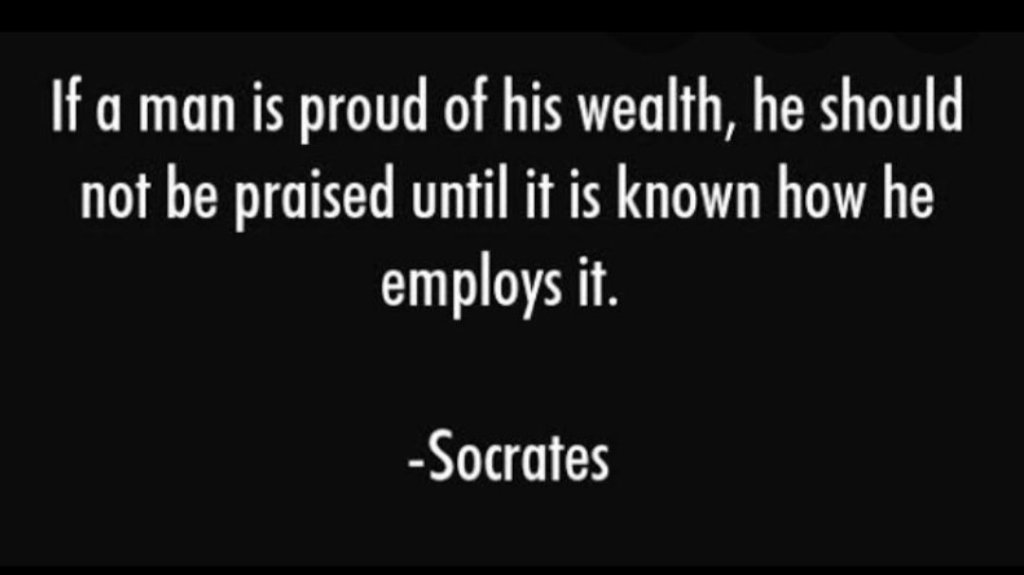
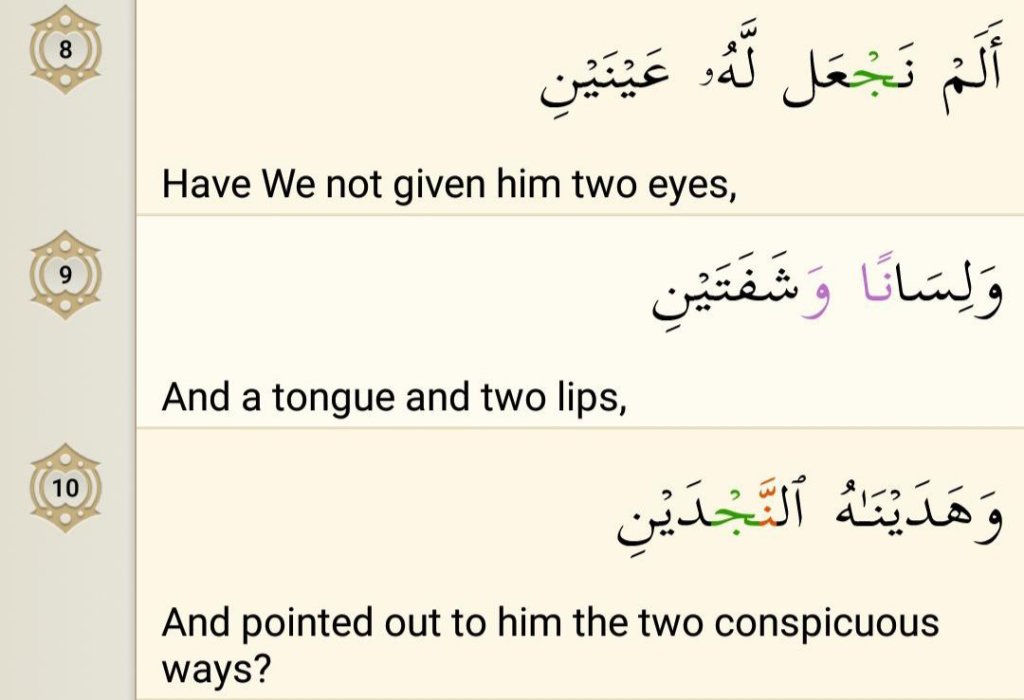
The Gifts of Sight, Speech and Guidance!
After mention of pride of man previously now three great material gifts and a great spiritual gift, all which are from the most important divine gifts, are pointed out. The gifts of eyes, tongue and lips are on one side, and the gift of knowledge and guidance is on the other side!
The eyes are the most important means by which to communicate with the outside world. The wonder of the eyes is such that makes man humiliate himself in front of the Creator. Each of the seven parts of the eye; the sclerotic cornea, choroid, iris, dermoid, aqueous humor, vitreous humor, and retina has a wonderful structure in which the laws of light and mirrors, physically and chemically, are so precisely coordinated that the most modern cameras are worthless in comparison to them. It’s wonders are enough to recognize the knowledge and power of Allah.
Next, the tongue is referred to, which is the most important means of speech and speech itself is the most important means of communication for human beings. It is with language that humans are able to convey the experience and information from one generation to another. If it were not so, man could never develop so well in knowledge, science, and civilization both in material and spiritual affairs.
Then, the lips are mentioned. They have an effective function in speech because many sounds and phonemes, in language, are produced by the lips. So Allah gave man these tools to search for His Creator and purpose!
Finally the gift of guidance! Allah says that We have not left man alone after granting him the faculties of thinking & reasoning so that he may have to search out his own way, but We have also guided him both the highways of good and evil through inbuilt guidnace & revelation, so that he may consider them seriously & choose one or the other way on his own responsibility.
The word najd means a mountain that has no vegetation or trees and is bare rock and in there is a clear path leading up. The image given in this verse is that of a man at the foot of a mountain with two paths ahead of him, one leading right and one leading left and Allah has clearly shown where each path leads. One of these paths is easy but gets difficult the further up you get and the second is difficult early on but gets easier as one progresses further. There is a parallel here to the struggle of man.

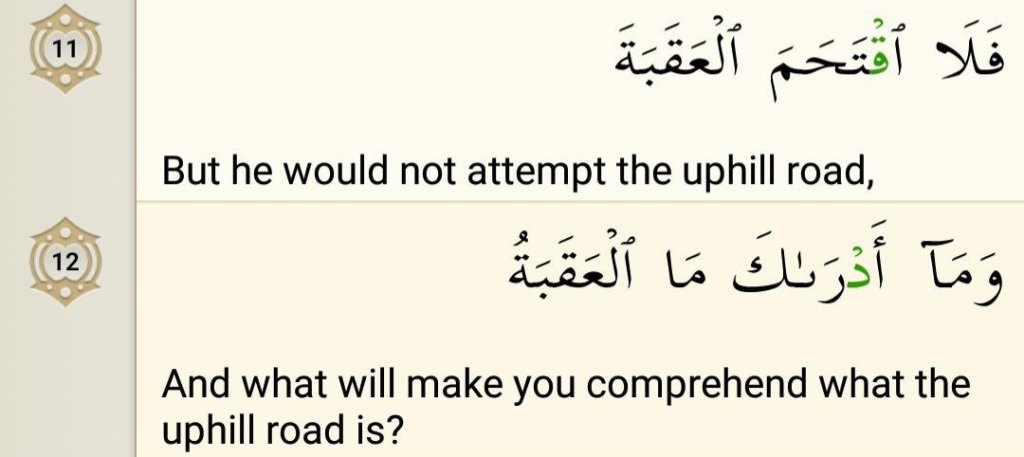
Now Allah is telling us that after showing man the two paths, man choses not to commit himself to the hard path, what Allah calls the Aqabah!
Iqtiham means to apply oneself to a hard and toilsome task, and aqabah means the steep path that passes through mountains for ascending heights. Thus, the verse means that one of the two paths that Allah has shown man, leads to heights but is toilsome and steep; man has to tread it against the desires of his self and the temptations of Satan. And success lies at the end of this hard path.
Why didn’t the man climb the tougher path? Allah has given man eyes and the ability to seek truth so why didn’t he climb the steep path? As if Allah is complaining that the man did not jump right in take up the struggle and in doing it is almost as if He is giving us a challenge to engage in this struggle.
The other path is an easy and slippery one which descends into desires, but does not require any hard work from man; one only needs to give free reins to oneself, then one automatically goes on rolling down the ultimate loss. Now, the man to whom Allah had shown both the paths, adopted the easy down-hill path and abandoned the toilsome path, which leads to the heights.
Being a true Muslim and having true Faith are not obtained simply by raw claims and merely stating such. There are some difficult uphill roads in front of every believer which he must pass, one after another, and by the help of Allah and under the light of faith and sincerity he can succeed.

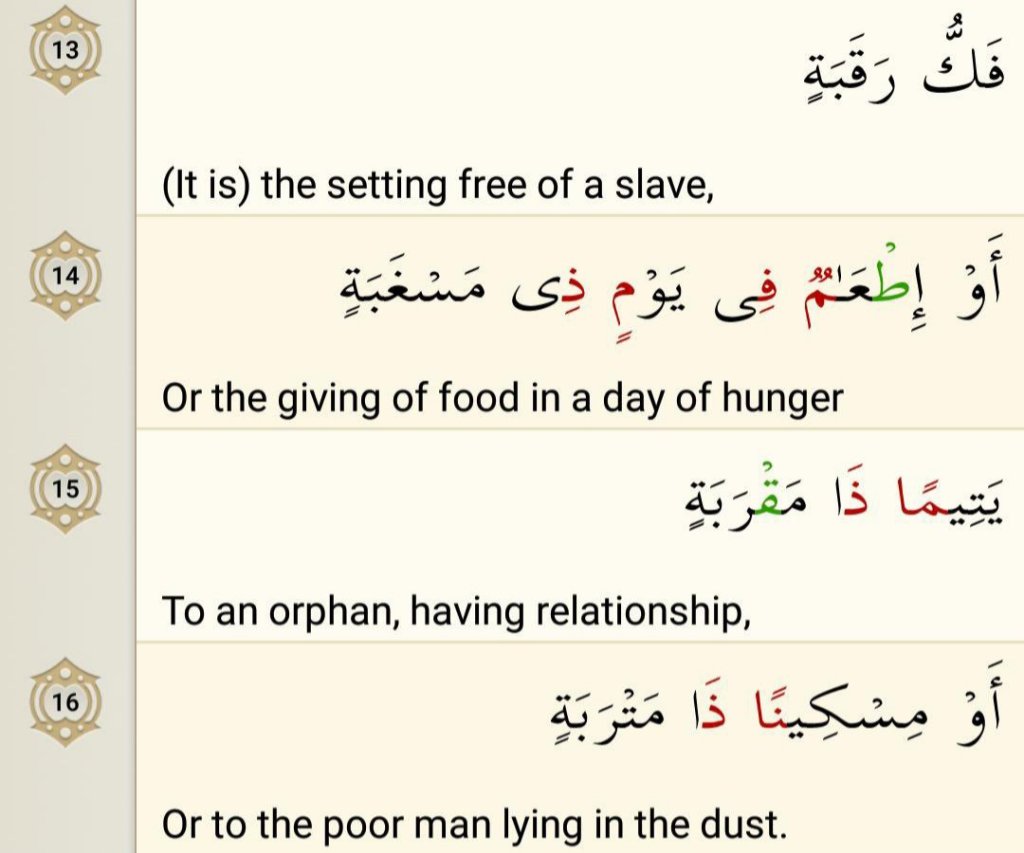
Now Allah mentions the key features of the uphill road, for which only the unfortunate person never prepares himself to pass. It is a collection of good deeds and pivots on helping people, especially the poor, and is also a collection of the pure, righteous believers which are mentioned in these upcoming verses. Truly, regarding the intensive love of most people for wealth, climbing this uphill road is really difficult. But for a true believer, it is an opposite case!
Here it is being stated as to what expenditure of wealth it is which leads man up to moral heights instead of causing him to sink into moral depravity. But in this there is no enjoyment for the self; on the contrary, man has to exercise self-restraints and make sacrifices.
The expenditure or the real acts Allah wants from us is that,
➖One should set a slave free, or should render a slave monetary help so as to enable him to win his freedom by paying the ransom, or free a debtor from his debt, or secure release of a helpless person without means from penalties.
➖One should feed a nearly related orphan (an orphan who is either a relative or a neighbour) who is hungry, and a needy, helpless person who might have been reduced to extreme poverty and might have none to support and help him.
Helping such people does not win a person fame and reputation, nor feeding them brings him the admiration for being wealthy and generous which one usually wins by holding banquets to thousands of well-to-do people. But the path to moral and spiritual heights passes on steep uphill roads only.
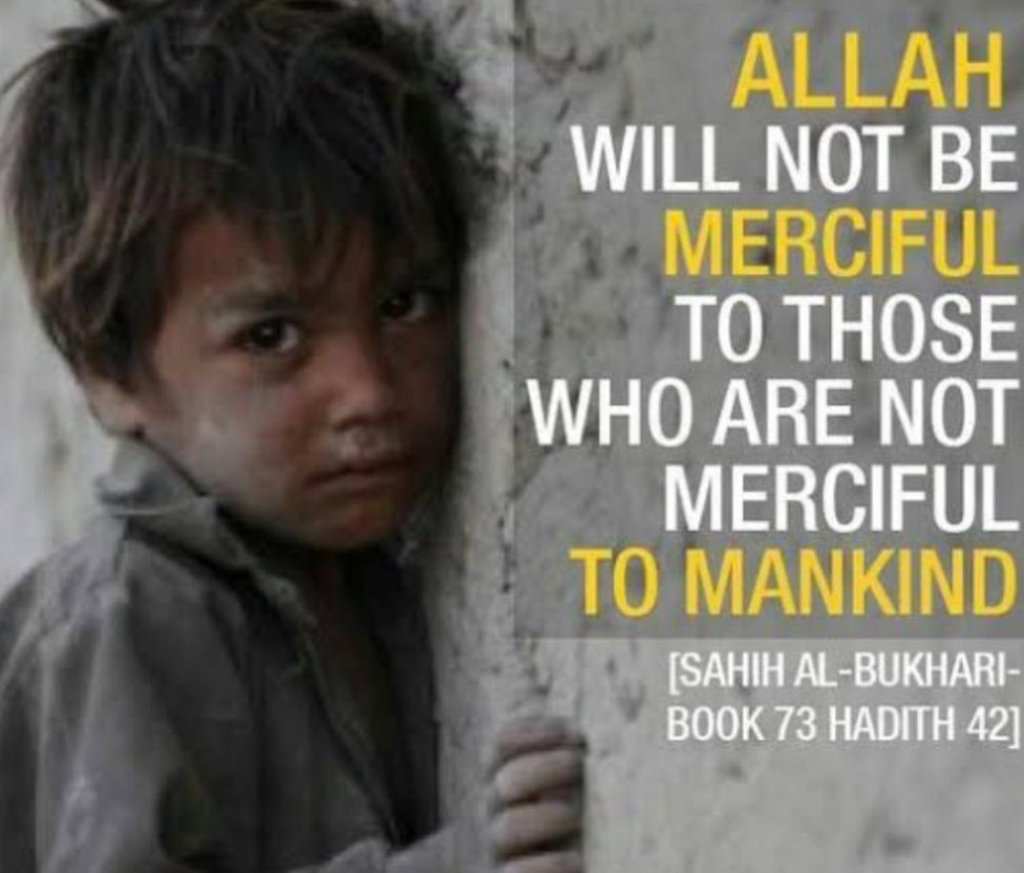
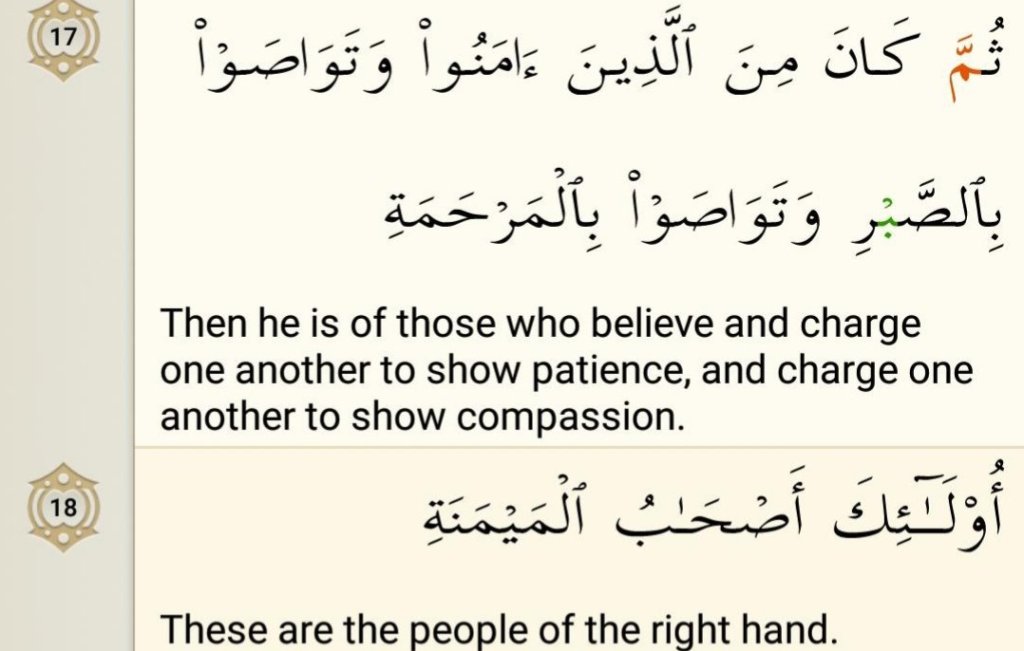
In addition to the previously mentioned qualities it is essential that one should be a believer, for without faith no act is an act of virtue, nor acceptable in the sight of Allah. At numerous places in the Quran it has been stated that only such an act of virtue is appreciable and becomes a means of salvation as is accompanied by faith.
Only believing as an individual and remaining content with it is not what is desired; what is desired is that every new believer should join those who have already believed so as to form a party of the believers, to bring about a believing society, which should work for establishing the virtues and wiping out the evil as demanded by the faith.
The two main important characteristics of the believing group or society, which are expressed here are patience and mercy! The first characteristic is that its members should exhort one another to patience, and the second that they should exhort one another to compassion and mercy.
Patience…
The entire life of a believer is a life of patience. As soon as a man stops on to the path of the faith, test of his patience starts. Patience is required to be exercised in performing the acts of worship enjoined by Allah, patience is needed in carrying out the commands of Allah; abstention from the things forbidden by Allah is not possible without patience; patience is needed in abandoning th evils and in adopting the pure morals; temptations to sin faced at every step can be resisted only by recourse to patience. On countless occasions in life obedience to God’s law entails losses, troubles, hardships and deprivations, and disobedience to the law seems to bring benefits and pleasures. Without patience no believer can fare well on such occasions. When one becomes weak in holding to this path, the believers push one another to regain energy and move forward so this is a unique bonding tied with patience to carry on to the straight path.
Mercy…
As for mercy and compassion, it is the distinctive feature of the society of believers that they are not a hard-hearted, merciless and unjust people but a society whose members are merciful and compassionate to humanity at large and sympathetic and friendly among themselves. A believer as an individual is an embodiment of Allah’s quality of mercy and the group of the believers as a party also is a representative of Allah’s Messenger, who has been described thus:
“O Muhammad, We have sent you to be a real blessing for the people of the world.”
(AI-Anbiya V:107)
Those who do this will be on the right hand side…
The term ashab al yameen refers to those people who are on the right side on the day of Judgement, who will dwell in paradise and who will have their books given in their right hands. The term ashab al maymanah though refers to those people who are on the far right, people who are extra secure on the right path, closer to Allah’s mercy and far from the centre. May Allah make us from them!
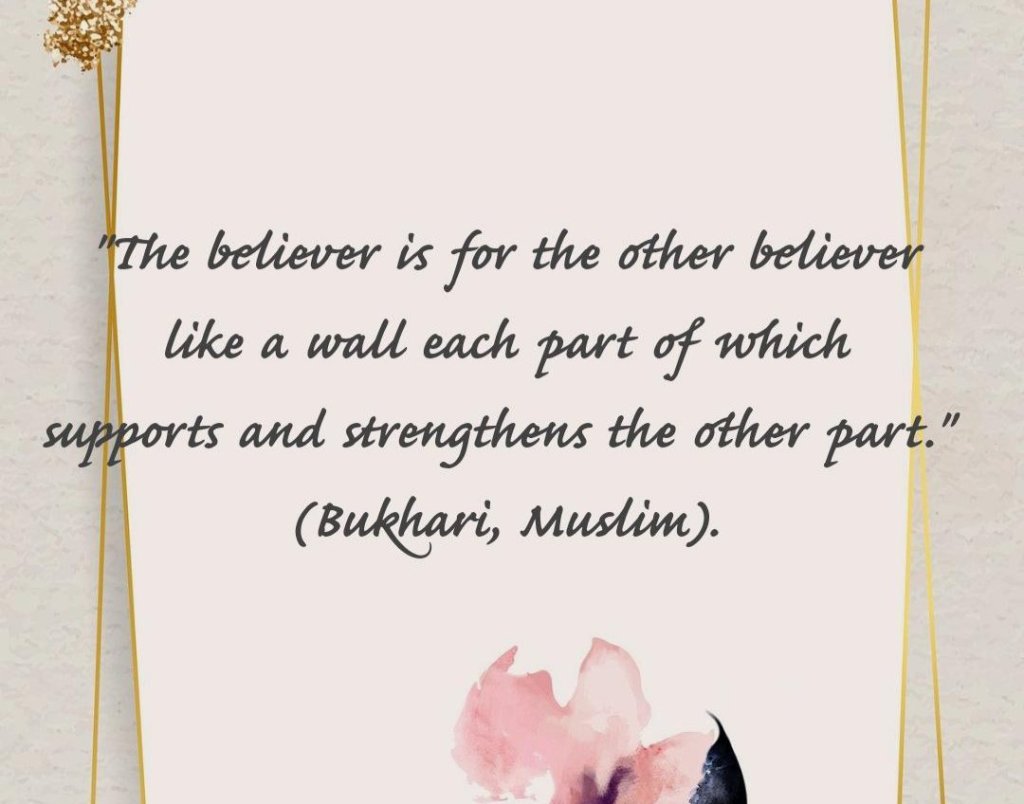
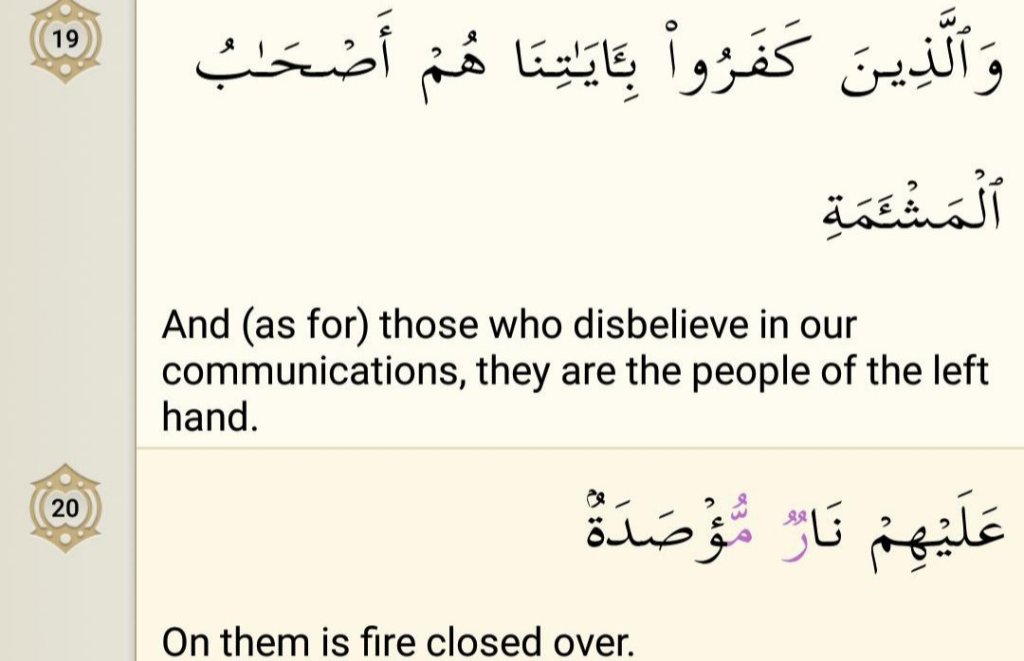
Now Allah mentions the people of the left hand, the loosers! It is because of their disbelief in the miraculous signs of Allah. Often when one thinks of imaan they think of imaan in Allah but this Surah is highlighting imaan in something else, imaan in the revelations of Allah. This is because the revelation of Allah is the one true guide to solving the problems of humanity. Those who are in disbelief of this guidance are in kufr and will continue to experience corruption in the land. The word mashamah in Arabic means the overwhelming curse. Thus, Allah is saying that those who disbelieve in His miraculous signs are people associated with the curse or the left side as mashamah also means the left hand side. The Arabs considered things associated with the left hand side as a cursed or vile thing and this is something that has continued in the tradition of Islam. For example in purification Muslims use the left hand and use the right hand for good and blessed things and this is the sunnah of the Messenger pbuh also.
The ayaat of Allah are of two kinds, the revelation and the creation. We often understand a disbeliever to be someone who denies the revelation but there can also be kufr in the other signs of Allah. There are miraculous signs inside and outside us in addition to the miraculous signs inside the revelation of Allah. In this Surah alone there are miraculous signs in how Allah looks inside the psyche of the human and tells us what he is thinking without that person even disclosing it. Thus, Allah has captured these people’s inner thoughts in his miraculous revelation and yet even this they deny, refusing to reflect on it.
There end result will be Hellfire, fire will be so covering them from every side that they will find no way of escape from it.
It is obvious that when a person is shut in a room with hot, stuffy air, he wishes to open the doors and let the fresh air come in; making the room comfortable to live in. With this thought in mind, we may now consider the status of the fervent Hell with all the doors closed. What a suffocating condition it will have!
The ultimate message of this Surah is that the people who will have the easiest transition to Islam are those people that are decent human beings, the people that are not engulfed in self-pleasure and who have concern in humanity.
